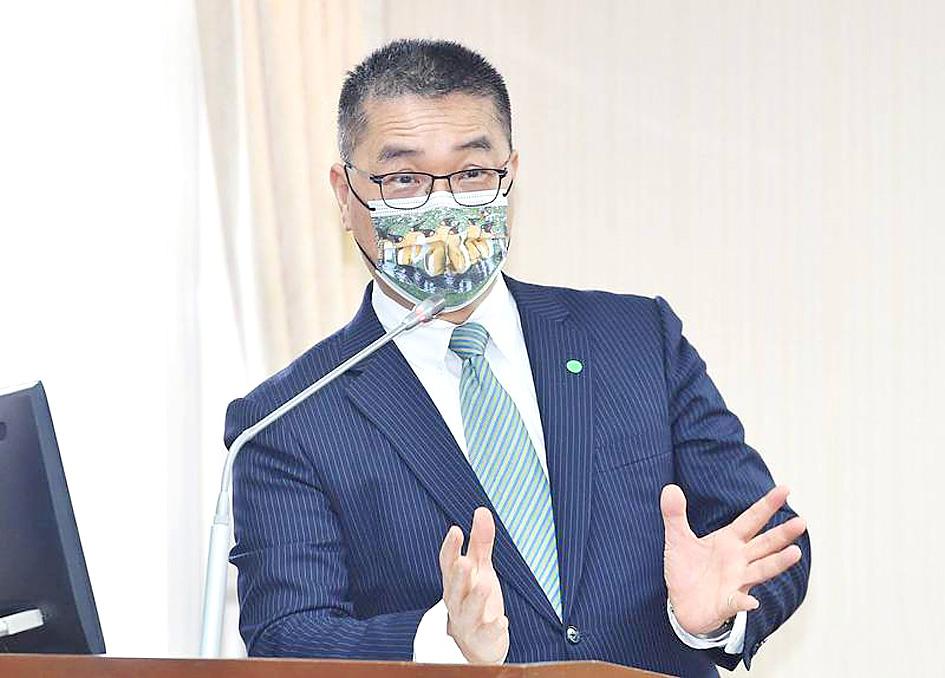Professionals from Hong Kong or Macau may extend their residency for up to one year under new rules announced yesterday by the Ministry of the Interior.
The amendments to the Regulations Governing Residency or Permanent Residency for People of the Hong Kong Area and the Macau Area (香港澳門居民進入臺灣地區及居留定居許可辦法) were passed to comply with the Act for the Recruitment and Employment of Foreign Professionals (外國專業人才延攬及僱用法) promulgated on July 7 last year, the ministry said.
The government has to offer measures that would not only attract professional talent, but also encourage them to bring over their families, and allow their families to find jobs in Taiwan, it said.

Photo: Lee Hsin-fang, Taipei Times
The amendments allow Hong Kong or Macau professionals or students looking for work to apply to extend their residency by up to six months, which, if necessary, could be extended once.
Regulations on foreigners obtaining an employment gold card, as well as those accompanying the gold card applicant, have also been eased, the ministry said.
To attract people from Hong Kong and Macau studying in Taiwan to stay after graduation, they can use their master’s or doctorate degree to reduce the five-year requirement to apply for permanent residency by two years and one year respectively, it said.
Meanwhile, a motion to further relax working permits for professionals from Hong Kong and Macau who have stayed in Taiwan for five consecutive years and have, within the past year, earned a salary that is double the monthly minimum wage to apply for permanent residency and obtain a National Identification Card, has been put on hold due to controversy and a lack of support from the Democratic Progressive Party.
Minister of the Interior Hsu Kuo-yung (徐國勇) said the ministry would continue to discuss the motion with legislators.
To obtain permanent residency, current regulations state that people entering Taiwan on a student visa would have to stay for five consecutive years after completing their studies, having spent at least 183 days in Taiwan each year, and earn a salary that is double the monthly minimum wage.

A group of Taiwanese-American and Tibetan-American students at Harvard University on Saturday disrupted Chinese Ambassador to the US Xie Feng’s (謝鋒) speech at the school, accusing him of being responsible for numerous human rights violations. Four students — two Taiwanese Americans and two from Tibet — held up banners inside a conference hall where Xie was delivering a speech at the opening ceremony of the Harvard Kennedy School China Conference 2024. In a video clip provided by the Coalition of Students Resisting the CCP (Chinese Communist Party), Taiwanese-American Cosette Wu (吳亭樺) and Tibetan-American Tsering Yangchen are seen holding banners that together read:

UNAWARE: Many people sit for long hours every day and eat unhealthy foods, putting them at greater risk of developing one of the ‘three highs,’ an expert said More than 30 percent of adults aged 40 or older who underwent a government-funded health exam were unaware they had at least one of the “three highs” — high blood pressure, high blood lipids or high blood sugar, the Health Promotion Administration (HPA) said yesterday. Among adults aged 40 or older who said they did not have any of the “three highs” before taking the health exam, more than 30 percent were found to have at least one of them, Adult Preventive Health Examination Service data from 2022 showed. People with long-term medical conditions such as hypertension or diabetes usually do not

POLICE INVESTIGATING: A man said he quit his job as a nurse at Taipei Tzu Chi Hospital as he had been ‘disgusted’ by the behavior of his colleagues A man yesterday morning wrote online that he had witnessed nurses taking photographs and touching anesthetized patients inappropriately in Taipei Tzu Chi Hospital’s operating theaters. The man surnamed Huang (黃) wrote on the Professional Technology Temple bulletin board that during his six-month stint as a nurse at the hospital, he had seen nurses taking pictures of patients, including of their private parts, after they were anesthetized. Some nurses had also touched patients inappropriately and children were among those photographed, he said. Huang said this “disgusted” him “so much” that “he felt the need to reveal these unethical acts in the operating theater

Heat advisories were in effect for nine administrative regions yesterday afternoon as warm southwesterly winds pushed temperatures above 38°C in parts of southern Taiwan, the Central Weather Administration (CWA) said. As of 3:30pm yesterday, Tainan’s Yujing District (玉井) had recorded the day’s highest temperature of 39.7°C, though the measurement will not be included in Taiwan’s official heat records since Yujing is an automatic rather than manually operated weather station, the CWA said. Highs recorded in other areas were 38.7°C in Kaohsiung’s Neimen District (內門), 38.2°C in Chiayi City and 38.1°C in Pingtung’s Sandimen Township (三地門), CWA data showed. The spell of scorching